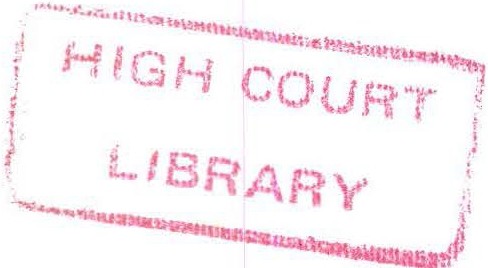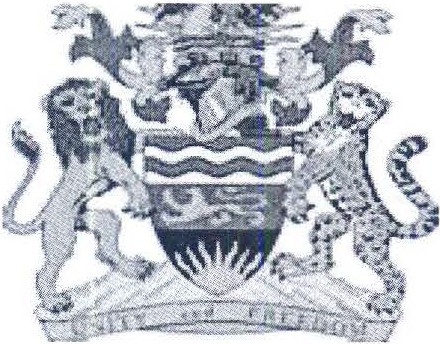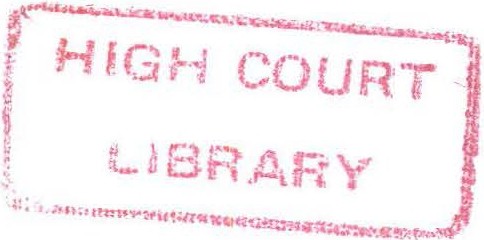


IN THE HIGH COURT OF MALAWI
PRINCIPAL REGISTRY
JUDICIAL CAUSE NO. 84 OF 2015
BETWEEN:
THE STATE
AND
MALAWI REVENUE AUTHORITY .............................RESPONDENT
AND
MAPETO [DWSM] LIMITED ...................................... APPLICANT
CORAM: THE HON. JUSTICE H.S.B. POTANI
Mr. Msuku, Counsel for the Applicant Mr. Chungu, Counsel for the Respondent Mr. Kanchiputu, Court Clerk
RULING
This is the court's determination on the respondent's preliminary objection to the judicial review proceedings commenced by the applicant.
Pursuant to Order 53 of the Rules of the Supreme Court (RSC) and through an ex parte application, the applicant sought and was granted the leave of the court to commence judicial review proceedings for purposes of challenging the decision of the respondent not to institute appeal proceedings in relation to the tax assessment conducted on the applicant. Upon being served with the processes relating to the
intended judicial review, the respondent filed and served a notice of preliminary objection to the hearing of the judicial review. According to the notice, the objections are made pursuant to sections 98 and 105 of the Taxation Act and sections 43 and 44 of the Value Added Tax Act. There are two grounds of objection raised namely:
1. That there is another matter in respect of the same subject matter as the action herein, which is currently pending ruling before the Supreme Court of Appeal: (DWSM) Ltd v MRA, Civil Appeal Number 54 of 2014; thus, proceeding with the present matter would not only be a duplication but also an abuse of the Court process .
2. That, in the alternative, there be a Consent Order in respect of the said matter in the Supreme Court of appeal, withdrawing the Appeal therein, so as to pave way for Appeal procedures as laid in the Tax laws as emphasized in the decision in Mapeto (DWSM) Ltd v MRA, Judicial Review Cause Number 58 of 2014.
It must be pointed out at the outset that looking at the way the grounds of objection are fashioned, it is the considered view of the court that it is only the first ground which is amenable to determination by the court. This is the view of the court as a reading of the second ground, which is in the alternative, clearly proposes execution of a consent order and a consent order by its very nature is a product of engagement between parties and not that of or from the court. This view is fortified by what counsel said after making all the oral arguments and submissions on the matter captured on page 31 of the court's handwritten record/notes as follows:
Msuku: In view of the alternative prayer which seems acceptable to both parties we may need to engage so as to come up with specific terms and conditions.
Chungu: We can explore that avenue.
There is no dispute at all that indeed as averred in the first ground of objection, there is an appeal in the Supreme Court of Appeal involving the same parties. In that appeal, the applicant herein is the appellant and the respondent is again the respondent.
It is the contention of the respondent that in essence, the appeal is in respect of the same subject matter in these proceedings and that the reliefs sought are the same hence the argument and submission that these proceedings are a duplication and also an abuse of the court process and therefore the applicant should be stopped in its tracks.
The applicant contends that the present proceedings are very distinct from those in the Supreme Court of Appeal, so too the relief being sought. According to the applicant, the relief being sought herein is to compel the respondent to set in motion the process of taking the decision of the respondent's Commissioner General on appeal to the Special Arbitrator as the respondent has shown unwillingness to do so while in the matter before the Supreme Court of Appeal, the relief being sought is stay of execution of the decision of the High Court dismissing the applicant's application for stay of enforcement of payment of taxes demanded by the respondent pending appeal to the respondent's Commissioner General.
In order to properly determine whether or not the present proceedings are a duplication of the matter in the Supreme Court of Appeal and therefore an abuse of court process, it is obviously imperative to appreciate the facts and issues in the two proceedings. The material before the court in totality shows that the proceedings now in the Supreme Court of Appeal started in the High Court under Miscellaneous Civil Cause No. 58 of 2014 before the Honourable Justice Kenyatta Nyirenda. The applicant sought an order staying the respondent's decision assessing the applicant's tax arrears at K902,088.274.15 pending appeal to the respondent's Commissioner General. In his judgement dated October 16, 2014, Justice Kenyatta Nyirenda dismissed the application saying that the applicant had alternative remedy in the form of an appeal under the relevant tax laws which was not pursued. Dissatisfied with the verdict, the applicant lodged an appeal before the Supreme Court of Appeal which on October 20, 2014, granted an exparte order of stay of the decision appealed against. The relevant part of the order of stay reads:
It is hereby ORDRED and DIRECTED as follows:
1. That the decision of the lower court dismissing the Appellant's application herein BE and is HEREBY stayed for a period of I 4 days pending hearing of the inter partes summons for the continuation of the within order to be heard on 3rd November 2014.
2. That consequently, an order BE and is HEREBY granted staying enforcement of the Respondent's decision assessing the Applicant's tax liabilities herein at K902, 088.274.25
3. That the Applicant do file inter partes summons for continuation of this order forthwith.
In compliance with the direction 3 above, the applicant on the same October 20, 2014, filed the interpartes summons but it was assigned a hearing date of 4th and not
3rct November as the court had directed. The ruling of the Supreme Court of Appeal on the inter partes summons/hearing is yet to be handed down. In the meantime, according to the applicant, as deposed in paragraphs 10 and 11 of the affidavit in support of the exparte application for leave to commence the present judicial review proceedings, the respondent's Commissioner General reduced the tax assessment from K902,088,274.25 to K623,485 ,581.10 which the applicant contends vindicated its assertion that the its tax liabilities were inflated. It is the applicant's averment that still dissatisfied with the reduced tax assessment, it initiated the appeal process to the Special Arbitrator by drafting FL8 exhibited in the affidavit in support of the application for leave to move for judicial review but upon being served with FL8 the respondent questioned the competence of the applicant saying under the law it is the respondent that is mandated to refer the matter to the Special Arbitrator where upon the applicant withdrew FL8 and instead furnished the respondents grounds of appeal under cover letter FLJ 0 dated May 26, 2015. Noting that the respondent was not acting on the matter, the applicant sent a reminder by letter FL11 dated June 22, 2016, in response to which the respondent by letter FL2 of even date indicated that the reference to the Special Arbitrator had to wait for the outcome of the matter pending before the Supreme Court of Appeal.
The position of the law seems to be that generally, it would amount to an abuse of the process of the court for a plaintiff or an applicant to maintain two causes of action on the same issues. In National Bank of Malawi v Gondwe [1993] 16(1) MLR 376 the High Court had occasion to consider whether the plaintiff s action was an abuse to the court process. This is what Tambala J said:
I shall now consider submissions made by both counsels. Mr Chizumila submitted, inter alia, that in commencing this action while a counterclaim grounded basically on the same facts is still pending in court, the plaintiffs are guilty of abuse of the court's process. In the counter-claim the plaintiffs are proceeding against the company whose liability is primary. In the pre sent action they are claiming the same amount from the defendant whose liability as a surety is secondary. Originating summons provides a simpler and more expeditious mode of prosecuting an action. I do not think that the plaintiffs committed abuse of the court's process when they started the present action. If they succeed in the present claim, they will obviously discontinue the counterclaim.
As can be seen from the above dictum, it is not in every case where a plaintiff maintains two actions that would amount to abuse of court process. Each case must be decided on its facts and in its context. In Kasungu Flue Cured Tobacco
Authority v Zgambo [1992] 15 MLR 174 the Supreme Court of Appeal held that it was an abuse of court process to seek relief in one court and, when the relief was granted, to refrain from acting on it but to seek a substantially similar relief from another court.
In the case at hand, as pointed out by counsel for the applicant, what the applicant sought in the proceedings that are before the Supreme Court of Appeal, which started as a miscellaneous application in the High Court, was an interim relief, that is, stay of enforcement of the respondent's tax assessment pending an appeal to the Commissioner General. By the very nature of the relief the applicant sought, as correctly submitted by counsel for the applicant, the matter in the Supreme Court of Appeal would not determine the rights of the parties in so far as the subject matter is concerned. In the present proceedings, which are judicial review proceedings, what the applicant is seeking is to compel the respondent to perform its statutory obligation of referring a tax dispute to the Special Arbitrator which would certainly entail a determination of the rights and duties of the parties. It must hastily be said that the court should not be misunderstood to be saying that the present proceedings cannot be an abuse of court process merely because they are a judicial review while those pending in the Supreme Court of Appeal arise from a miscellaneous application. That is not the point. The point is that although they relate to the same subject matter, the reliefs sought are different. And to further demonstrate that the reliefs sought are different it appears to this court, on the facts, that whichever way the decision of the Supreme Court of Appeal will go, that is, whether stay will be granted or not, would not necessarily affect the fate of these proceedings. The decision will not resolve the dispute over the tax assessment which by these proceedings the applicant would wish to compel the respondent to refer to the special arbitrator. Of course the decision that would come out would be either to the advantage or disadvantage of the applicant. Should the Supreme Court of Appeal grant the stay, it would mean the applicant would have a temporary relief of not having to pay the disputed assessed taxes in the meantime but that would not extinguish its right to have the matter referred to the special arbitrator and should the stay be refused, the applicant would have to pay the assessed taxes but that would not mean that he cannot push for reference of the tax dispute to the special arbitrator. Therefore, the position of the court is that the mere fact that this matter relates to the
same subject matter in respect of which there is a pending appeal in the Supreme Court of Appeal does not make it a duplication or abuse of court process.
In the end result, the respondent's preliminary objection is abortive and is accordingly dismissed. Consequently, it is ordered that the hearing of the judicial review shall be on Friday, October 21, 2016, at 10.30 am. The parties to filed and serve on each other all necessary processes, if that has not yet been done by 4.00 pm on Tuesday, October 18, 2016. The parties to take note that at the hearing, each side shall the allocated a maximum of 20 minutes to present its case hence the hearing shall last 40 minutes.
Costs associated to the energies spent on the preliminary objection are awarded to the applicant.
 Made this day of October, 2016, at Blantyre in the Republic of Malawi.
Made this day of October, 2016, at Blantyre in the Republic of Malawi.
1